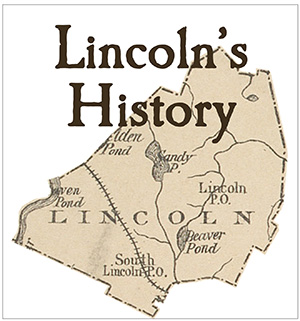The Old Town Hall has wandered quite a bit in its 175 years. It was built in 1848 at a time when Lincoln needed a new civic gathering place. Until then, the town had used the original meetinghouse built in 1746 where today’s stone church now stands. The new Town House was built opposite the meetinghouse across Bedford Road, with its classic Greek Revival colonnade facing south over the town common, toward the town well and where the Minute Men had mustered in 1775 (photo #1). There it stood for forty years, witness to the Transcendentalist and Abolitionist movements, the Civil War, industrialization, and the early gentrification of Lincoln. It was a witness as well when the old meetinghouse burned to the ground in 1859.
In 1891, when George Bemis gave the town funds to build a new civic center, the Old Town Hall was put up for purchase. James L. Chapin (1824‑1902) bought the structure, moved it down the hill to a site just north of the today’s white church (photo #2), and put it to good use as a general store, post office and gathering place. Chapin’s son George continued the business until his death in 1918. The building was then purchased by Charles S. Smith. Again, the structure was jacked up and moved to its current site on Lincoln Road. Remarkably, as the building was moved down the hill in stages on rollers and props, the store and post office remained open, with planks set up for customer access during business hours (photo #3).
The Old Town Hall continued as post office and general store for much of the twentieth century (photo #4), operated by Elmer A. and Charles L. Rollins and finally by Alfred M. Davis. In the 1950s there were two gas pumps out front, the post office and post boxes inside on the right, glass candy counter and racks of cigars and bagged snacks with canned goods and necessities on shelves on the left, and a walk-in refrigerated room and meat counter with a hamburger grinder plus an ice cream/popsicle freezer in the back of the building. The second floor was at various times occupied by law and real estate offices and a small publisher. A watering trough outside was a stopover for horses, at least one of which was known to eat popsicles, spitting out the sticks. Needless to say, kids on foot or bicycle found the store a perfect place to spend their weekly allowance.
As the Davis era came to an end, the building was acquired in 1962 by the nonprofit Old Town Hall Corporation. Residents still come by daily to pick up their mail, just as they did in the Chapin era. The Old Town Hall Exchange offers an eclectic collection of interesting items for sale, many on consignment, as well as antiques displayed in the basement.
Around 1990, the original glass display cases so memorably used for candy and cigars in the Chapin/Davis era were moved to the library for use. A decade later, they were judged unsafe for the library and were on the verge of being thrown into a dumpster when they were rescued and moved back to the Old Town Hall, where they’re being reutilized by the Exchange in their old location.
“Lincoln’s History” is an occasional column by members of the Lincoln Historical Society.


We can thank Craig Donaldson and Gus Browne, members of the board of the Lincoln Historical Society, for this wonderful piece.